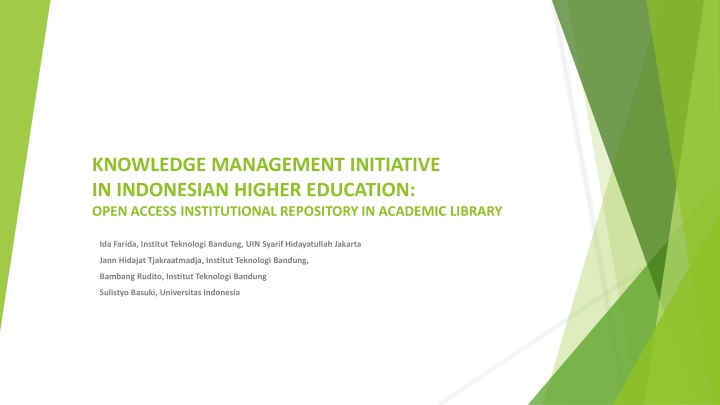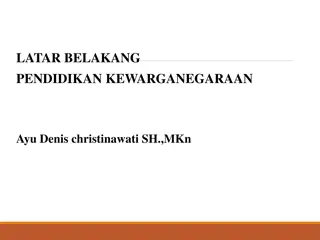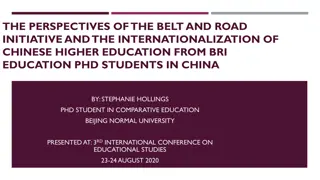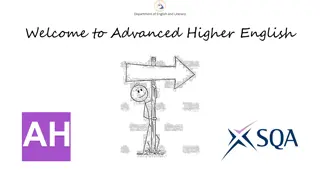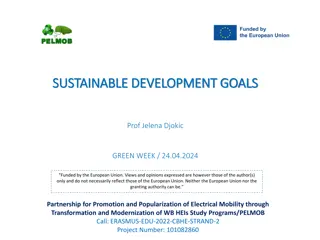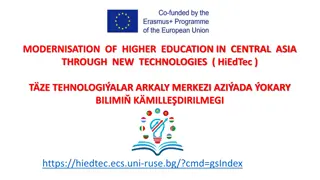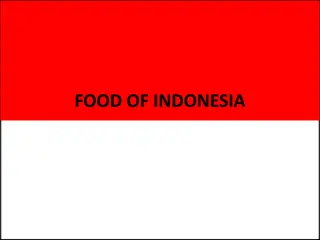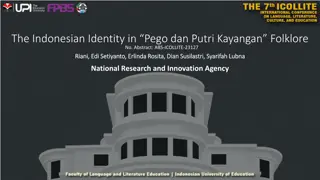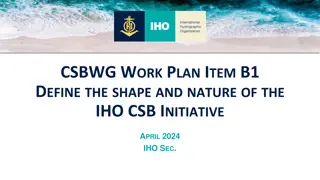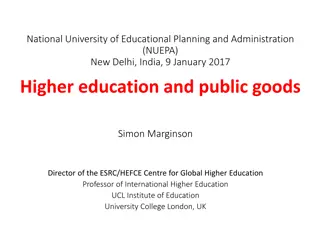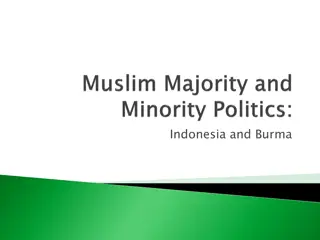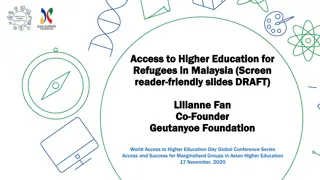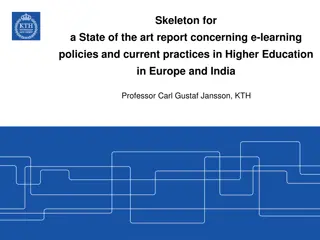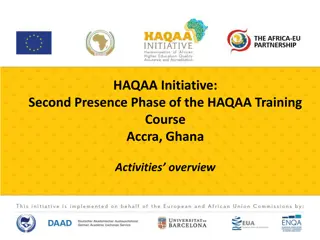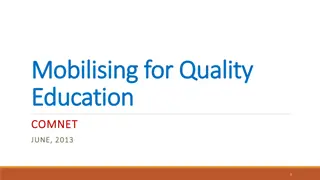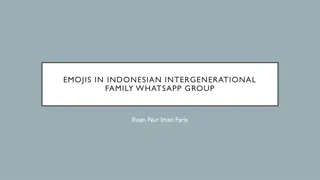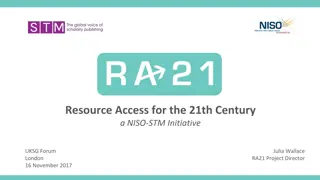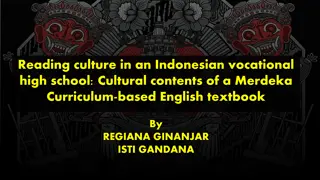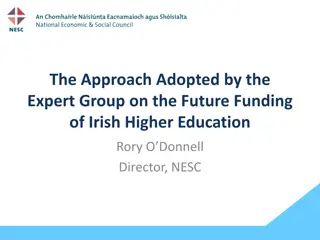Knowledge Management Initiative in Indonesian Higher Education: Open Access Institutional Repository
Higher Education in Indonesia implements Knowledge Management through Open Access Institutional Repository in academic libraries to share scholarly works globally without barriers. The initiative focuses on enhancing research impact by providing accessible knowledge assets.
Download Presentation

Please find below an Image/Link to download the presentation.
The content on the website is provided AS IS for your information and personal use only. It may not be sold, licensed, or shared on other websites without obtaining consent from the author.If you encounter any issues during the download, it is possible that the publisher has removed the file from their server.
You are allowed to download the files provided on this website for personal or commercial use, subject to the condition that they are used lawfully. All files are the property of their respective owners.
The content on the website is provided AS IS for your information and personal use only. It may not be sold, licensed, or shared on other websites without obtaining consent from the author.
E N D
Presentation Transcript
KNOWLEDGE MANAGEMENT INITIATIVE IN INDONESIAN HIGHER EDUCATION: OPEN ACCESS INSTITUTIONAL REPOSITORY IN ACADEMIC LIBRARY Ida Farida, Institut Teknologi Bandung, UIN Syarif Hidayatullah Jakarta Jann Hidajat Tjakraatmadja, Institut Teknologi Bandung, Bambang Rudito, Institut Teknologi Bandung Sulistyo Basuki, Universitas Indonesia
Introduction Higher Education (HE) is one of organizations interested in using Knowledge Management for managing its abundant knowledge assets. The leader of KM initiative in Indonesian HE is academic library, especially when it supports Open Access Institutional Repository (OAIR) known as green roads movement that is to make available the scholarly work produced by the academic community for global audience without economic barriers. Initially, IR is an effort to gather local content of academic works from an institution in digital format with the objective for facilitating access of knowledge produced by community campus; mostly the access is restricted to its community. Open Access (OA) Initiaves which declared in Budapest in 2001 gives a common ground to reform the existing system of scholarly communication. Open Access Institutional Repository becomes new alternative to share scholarly works to wide audience.
Introduction IR is regarded as KM visible manifestation and as KM implementation in Higher Education or academic context (Mccord, 2003; Branin,2005). In this paper, OAIR in Indonesian Higher Education is viewed as Knowledge Management initiative within academic context institutions. Adopting OAIR in Indonesian Higher Education is especially promising for sharing its knowledge assets to enhance global access of Indonesian scholarly works and eventually enhance research impact (Davies, 2007). In 2009, there was a national effort to share local knowledge content from various institutions in Indonesia including OAIRs in Higher Education. Directorate of Research and Service Community-Higher Education, Ministry of Education and Culture (Direktorat Penelitian dan Pengabdian pada Masyarakat/DP2PM Dikti Mendikbud RI) collaborated with University of Indonesia to build a portal named Garuda, the abbreviation of Garba Rujukan Digital. Building OAIR in HE, especially in developing its knowledge content is not an easy task. Learning from previous literatures, a conceptual model of OAIR is developed. The proposed conceptual model focuses on three constructs; people, process and technological function.
BENEFITS OF OAIRS Provides a Single Consolidated Integrated System Makes the Scholarly Works Accessible to World Wide Audiences The main purpose of disseminating intellectual works is to make those works accessible to world-wide audiences. Problems are: Research outputs usually are located in different information systems which make potential users having hard times in searching, browsing and accessing the scattered information. Providing free available full text through internet access is a good strategy to increase citation times and increase the reputation of the institution The service is not well supported and only provides metadata and abstracts rather than full text. One study conducted by Hajjem et al (2005) found out that that free online papers will increase their cited times from 50 percent to 250 percent. There is no systematic ways to deposit scholarly output of the institution in digital format like conference papers and technical reports (Chen & Hsiang , 2009)
Indonesian OAIRs in Ranking Web of Repositories, January 2013 Ranking World Rank 26 Institution Size Visibility Files Rich 4 scholar 1 Institut Teknologi Sepuluh Nopember Repository Diponegoro University Institutional Repository Bogor Agricultural University Scientific Repository Universitas Muhammadiyah Surakarta Digital Library Gunadarma University Repository Andalas University Repository E-Library Universitas Brawijaya Yogyakarta State University Repository UPN Veteran Jatim Repository Digital Library Universitas Islam Negeri Sunan Kalijaga Yogyakarta University of Muhammadiyah Malang Institutional Repository Hasanuddin University Repository Institutional Repository UPN 'Veteran' Yogyakarta Petra Christian University Scientific Repository Repository Universitas Padjadjaran University of Sumatera Utara Repository 8 211 8 2 32 245 104 33 14 3 57 110 264 7 19 4 60 180 295 20 11 5 6 7 8 9 10 73 188 238 239 363 364 752 224 305 411 1012 737 64 80 886 666 688 839 408 139 30 176 286 458 87 767 31 64 140 58 11 372 532 978 186 60 12 13 445 476 670 1058 675 915 351 449 389 133 14 514 349 961 1013 137 15 16 516 639 618 44 1049 96 294 12 211 1440
Indonesian OAIRs in Ranking Web of Repositories, January 2013 Ranking World Rank 779 790 Institution Size Visibility Files Rich 1087 989 scholar 17 18 (1) UIANA Universitas Indonesia Politeknik Elektronika Negeri Surabaya Repository Universitas Sebelas Maret Institutional Repository Sriwijaya University UNSRI Online Repository Graduate Program of Management and Business Bogor Agricultural University Repository Digital Library of Institut Teknologi Bandung Eprints STMIK GI MDP & MDP Business School Repositori Universitas Muria Kudus University of Surabaya Repository Repository Library of Malang University IAIN Sunan Ampel Repository Documents Repository Dian Nuswantoro University Institut Seni Indonesia Denpasar Institutional Repository LIPI Institutional Repository Lembaga Ilmu Pengetahuan Indonesia / Indonesian Institute of Sciences Universitas Pesantren Tinggi Darul 'Ulum Digital Repository Universitas Pelita Harapan Institutional Repository 625 901 1240 1183 270 342 19 822 1263 818 1003 751 20 21 826 841 1205 1179 1149 1052 733 355 510 804 22 23 913 938 182 884 434 1341 732 858 1366 527 24 25 26 27 28 984 1077 1219 1242 1337 1253 927 1416 1606 1425 1398 1377 1137 1105 1527 508 811 1023 1456 1193 634 884 1165 646 1023 29 1630 1559 1611 1456 1440 30 1635 1623 1558 1456 1440 31 1650 1524 1651 1456 1440 32 1653 1623 1653 1456 1440 Source: http://repositories.webometrics.info/en/Asia/Indonesia
Content Types in OpenDOAR -Indonesia OpenDOAR is an authoritative directory of academic open access repositories. It provides searching tool to find repositories and users are able to search using different approaches like subject, content type, repository type, country, language and software. This directory also gives Google custom search engine for searching the knowledge contents listed in OpenDOAR freely and almost academic contents are available full text
Mandatory Policy OAIR as Contributor for Garuda The main contributors of Garuda are from Higher Institutions. To gather scholarly works, some of the academics librarians are supported by the authority of campus, Rector, to legally endorse them with a decree issued by the rector. Out of 318 contributors in Garuda, 289 (91 %) are from academic portal. The rest comes from online journals 29 (9%). Some of OAIR in Higher Education has the decree which requires research unit, academia, and staff to submit their scholarly works to the repository. These academic portals are not necessarily an OAIR but they have potential to be a Knowledge Management Initiative. Though it has no sanction for the people who are reluctant to do so, it helps librarians to gather academic works in legitimate way. Unfortunately the contributors are lacking of knowledge content, 78% (226) of the contributors only have less than 1000 titles while the contributors who have more than 10,000 titles are 22% (63).
Example of Mandatory Policy in Indonesian HE No. OAIR Mandatory Policy Compulsory submission of scholarly works Peraturan Rektor Institut Pertanian Bogor. Nomor 06/13/PL/2010 Knowledge Type Acquired Target 1. IPB Repository (repository.ipb.ac.id) Undergraduate thesis, thesis, dissertation, Research report, Textbook, Reference Books, Book Module, academic speech, speech of senior lecturer, practicum guidelines, scholarly journals, articles of scholarly journals, patent, result of writing scholarly competition, seminar paper, proceeding. Final Paper. Thesis, dissertation, textbook, book module, research and community service report, practicum report, workshop/seminar papers, academic speech, inaugural speech, practicum guidelines book, scientific paper, patent result, result of student competition award from the 1st to 3rd position in institute/regional/national/and international level. Undergraduate thesis, thesis, dissertation, textbook, book module, research and community service report, practicum report, workshop/seminar papers, scientific speech, inaugural speech, practicum guidelines book, scientific paper, patent result, result of student competition award from the 1st to 3rd position in institute/regional/national/and international level. Unit, sivitas academic, educational human resources 2 ITS Digital Repository (digilib.its.ac.id) Compulsory submission of scholarly works. Rector decree of Institut Teknologi Sepuluh Nopember Number: 5455.5/12/LL/2008 academia 3. Ubaya Repository (repository.ubaya.ac.id Compulsory submission of scholarly works Rector decree of Universitas Surabaya, number 383 year 2012 Unit of the university, academia and staff.
Governments Policies From December 11, 2011 onward, every lecturer who wants promotion, he or she must provide the address of his or her scholarly works on website either on journal online, institutional repository, Garuda or other portal. Otherwise, those works have zero points in promotional assessment (Dikti, 2011). Indonesian government no. 37 year 2009 of lecturer, article 8 verse 1. It stated that post lecturer certification; every faculty must report in narration their academic performance in three mandates (research, teaching, and community service) in every semester
A CONCEPTUAL DEVELOPMENT OF OAIR Petrides and Nguyen (2006) emphasized that application of KM in HE must embrace the interactions between people, processes, and technology to share knowledge.
Knowledge Content Management Library Different unit /Structure Collaboration Teamwork Campus authority People Directorate of Communication and Information System Technological System Management Form of Knowledge Content Kind of Knowledge Content Identification of Scattered Knowledge Resources Socialization Content Recruitment Strategy Process Mediating Service Lecturer s promotion Lecturer s self submission Knowledge Recruitment Reward Student self-submission Quality Control of Knowledge Content Pro Open Access Technological Function Open Access Compromise Policy Repository System Building Developing easy access technology Contra Open access Webometric evaluation
OAIR Barriers There are many barriers that face the spread of OAIR: lack of support from authority body campus authority or government; shortage in qualified Human Resources in academic libraries, lack of technology specialists with knowledge in hardware and software technologies related to knowledge capturing and sharing; and lack of awareness and motivation from the faculty body and lecturers
